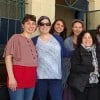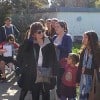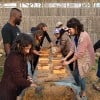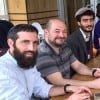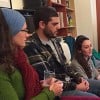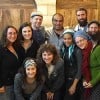by Eliahu Ebrahimi currently living in Tzfat and developing a vision for an eco-village in California Shabbat in Shuva I had the pleasure of spending a Shabbat in . After already having spent a week together, the Hakhel group had become a community in its own right. We were warmly absorbed into the community of Shuva, a moshav near Sderot, for a weekend. On Friday afternoon, I was invited to immerse myself in a mikvah in the middle of a field. I changed into my Shabbat clothes and was ready to transition into 25 hours of much-needed rest. Our group congregated on the back porch of one of the community member’s homes where we joined the Shuva-ites as they welcomed the Shabbat with song and dance. After nightfall, we made our way to an intimate indoor space where sat around a communal table sharing Torah insights, songs and stories for several hours while enjoying the delicious home-cooked meal. The following day, we all met at a community bris which was followed by an outdoor picnic outside of the synagogue. Parents, children, elderly, dogs, cats, peacocks — all coexisting in a chaotic harmony unlike anything I’ve seen. This was a normal […]
